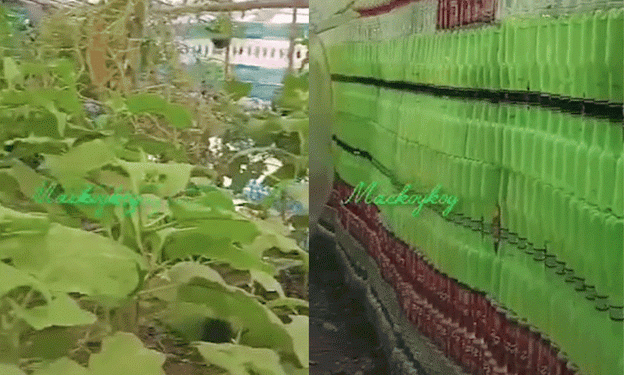Plastic waste has become a global environmental challenge, with over 300 million tons of plastic produced annually. In many rural areas, waste management systems are underdeveloped, leading to littering and pollution. Simultaneously, the rising costs of farming infrastructure often hinder small-scale farmers from improving their productivity.
Rosa, a farmer in Kapangan, Benguet, found an innovative solution to address both challenges. Alongside her husband, she collected over 6,000 discarded plastic bottles during street cleanups over the course of a year. These bottles, typically destined for landfills, were repurposed to create a durable and functional greenhouse.
How the Plastic Bottle Greenhouse Works
The design of Rosa’s greenhouse showcases the practical use of plastic bottles in agricultural infrastructure. The bottles are stacked and secured to form walls that trap heat and provide insulation for the plants. This is particularly effective in highland regions like Benguet, where cooler temperatures can limit crop growth.
The materials used are not only affordable but also highly durable, with plastic capable of withstanding weathering over several years. Rosa reports that the greenhouse has significantly improved her crop yields by extending the growing season and protecting plants from pests and harsh weather conditions.
The Environmental Impact
By using plastic bottles as a building material, Rosa’s initiative tackles the issue of plastic pollution head-on. Plastic waste contributes to soil degradation and water contamination, which are critical issues for agriculture. Repurposing plastic bottles reduces the environmental burden while promoting sustainable practices in farming.
This approach aligns with global efforts to reduce agricultural waste and carbon footprints. Studies have shown that sustainable waste management practices, such as recycling and repurposing, can significantly lower greenhouse gas emissions in rural communities.
Potential for Wider Adoption
Rosa’s greenhouse has garnered attention as a model for other farmers and communities. The affordability and accessibility of plastic bottles make this method replicable, especially in developing regions where resources are limited. Governments and agricultural organizations could support such initiatives through awareness campaigns and technical guidance.
The plastic bottle greenhouse in Benguet is a shining example of how ingenuity and environmental consciousness can transform farming practices. By addressing waste management and improving agricultural productivity, Rosa’s innovation offers a blueprint for sustainable and cost-effective farming. This initiative is not just a personal success but a call to action for communities to explore creative solutions to global challenges.










